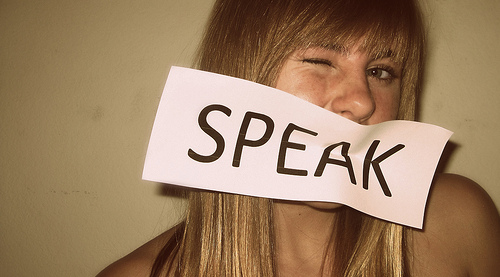Assertive Skills for Anxious People

People who have a problem with anxiety tend to react in negative ways to other people or situations, especially when they feel a need to avoid confrontation. When chronically anxious, they may feel uncomfortable with the way they communicate, but not know how to change it. For some people, their anxiety may predispose them to become passive, whilst others may actually feel quite aggressive at times. The lucky few will have learned how to become assertive.
If we start by looking at the typical range of feelings connected to high anxiety levels, we can see that most if not all, are usually negative. Here are some typical examples:
- Afraid
- Angry
- Impatient
- Doubtful
- Powerless
- Inferior
- Intimidated
- Resentful
- Insecure
- Pressured
- Misunderstood
- Lonely
- Untrusting

I have met many people with anxiety disorders, including mild and generalized anxiety disorder, who have admitted that their negative feelings or emotions often cause them further problems. Constant worry is tiring to both the mind and the body, and it can leave a person feeling on edge and fragile. That is only one end of the scale, because it can equally make one feel “pumped up” with anger and display a defensiveness that knows no bounds!
Because our emotions are heightened during an anxious time, we tend to cry or get angry quite easily. In the context of our personal relationships, this can be exasperating, both for sufferers, and those close to them. Arguments and impatience can ensue and in the worst case scenario, relationships can break down. If we cry too much in front of others we believe we are perceived as weak. If we get angry too often we begin to feel unlikable. There must be some middle ground!
Situation: Anxiety has made two women feel exhausted, agitated, sometimes fearful, and prone to feel panicky or suffer full blown panic attacks. They are both married and having a hard time getting their spouses to understand how they feel when they have discussed how anxiety affects them.
Their partners tell them that they have been invited to dinner with work colleagues but neither of the women wants to go.
One reacts by agreeing to go, knowing full well that she is extremely worried about it, but not daring to make an excuse or draw attention to herself. She doesn’t want to let her husband down despite how she feels. Her anxiety is heightened. She feels weak, intimidated, and frustrated.
The other woman flatly refuses to go. She gets angry and tearful when her husband says he has already accepted so it is too late. She tells him he is selfish and doesn’t care what she wants or how she feels. An argument follows and a stalemate is reached. This causes a terrible atmosphere, exacerbates the woman’s anxiety, and produces feelings of self pity, guilt, and resentment.
Of course, it is okay to be angry or cry sometimes, but because anxiety can wear us down we sometimes behave inappropriately or way out of proportion to the situation. Our impulsive behavior can lead to problems when parenting and in the workplace too. We become more anxious every time we feel discouraged, incapable, or misinterpreted, and this extra stress can cause us to become exasperated. We are not only angry towards others but we can have a tendency to turn that anger inwards. Resolving everyday problems that involve the people around us begins to feel too stressful to tackle. We lose the art of good communication as it is laced with unwanted emotion.
Here are a couple of examples of how the same situation may pan out in two people who has an anxiety disorder.
Examples or Assertiveness
This kind of ineffective communication has caused both women to feel worse instead of better. Of course it would help if their partners were more thoughtful and accommodating, but if the ladies had been effectively assertive from the start, they would not only be better understood but perhaps shown respect too.
Perhaps you consider the second angry reaction as a form of assertiveness? After all this woman is doing what she wants to do, and does not take kindly to the disrespect of her husband having already made the plans without consulting her. The fact is that her reaction took on an aggressive and defensive form, in which she turned the core of the problem away from herself and gave it to her husband. Maybe the anxious feeling of inadequacy was playing a part in her reaction?

Confidence and Self Control
Having an anxiety problem can make us feel as though we have lost some control, which can lead us to feel more insecure. With that insecurity, we often begin to lose some confidence and self-esteem. I know that when I personally suffered from anxiety disorders, my sense of control was diminished, and I felt incompetent generally. I felt as though no one truly understood either. Sometimes I caved in when asked to do something I didn’t want to do, or got upset when I felt I was letting people down. I forgot that I had rights too!
To be assertive in a healthy way, we need to be able to stand up for ourselves, for our convictions, and to some extent, for our self control or self-preservation. When we don’t feel good about ourselves, we often project this externally to other people. It is easy therefore, for those closest to us, who usually know how our anxiety affects us, to take advantage of our weaknesses. For some sufferers, this may present as being passive or literally being a doormat, whilst others may become bully-like in their approach to be understood and not walked on. Neither is productive and both often cause further anxiety.
Are you Unassertive?
You may think you are communicating in an assertive way when actually you are:
- Domineering
- Demanding
- Aggressive
- Pushy
- Overbearing
- Dogmatic
- Controlling
Anxiety can cause these behaviors, sometimes without you even realizing it. Because we feel a little lost, we may unintentionally try to regain some control in a forceful unproductive way. Subconscious fear and desperation may drive this behavior. Of course, some people behave or communicate in this way simply because they always have done. Our parents might have been overbearing and aggressive, or we may have had a traumatic childhood and to behave in this way has become almost a survival instinct. Being anxious can simply compound the original problems.
For those who have a long standing anxiety disorder, it isn’t unusual for the opposite to be true. Some people actually accept their weaknesses and see themselves as so ill that they fall into total submission. This means that often they are controlled by others and can even be mentally or physically abused, although that is a very worst-case scenario. They simply don’t feel they have the mental energy to stick up for themselves. Again, these people may have grown up to feel inadequate with little self confidence, and an anxious state just makes everything worse.
Anxious Behavior
| Assertive Behavior
|
|---|---|
Lack of confidence
| Building confidence
|
Self-esteem issues
| Greater self-esteem
|
Losing respect from others
| Gaining respect
|
Feeling misunderstood
| People understand you better
|
Feelings of hostility
| Feelings of calm
|
Indecisive
| Making good decisions and choices
|
Impatience with others (disrespect)
| Acceptance of others (compromise)
|
Powerless
| Feeling a sense of control
|
Becoming Assertive
Changing the way you communicate, to learn the art of assertiveness isn’t perfected overnight, and in fact can take some time to get right. You are breaking old habits, and to make it worse, your anxiety is telling you to behave negatively. It isn’t always about getting your own way either. Everyone has to earn respect, and the best way to achieve this is to show respect to others. If you look at the table above, you will see what you can regain by communicating assertively.
Resources for Learning Assertive Skills
I have included some particularly good books for learning assertive skills in this article. Of course it would be great if everyone could learn the art of effective communication, but people with anxiety problems may find it more difficult than others. That said, to turn any negatives into positives will benefit the anxiety level generally. There are free online courses and classes that can be taken locally (sometimes not an option if your anxiety is severe). Sometimes, joining a class is a good option as you get the chance to practice outside of your family and friends. Remember that it takes time to build good communication skills but the rewards can be far reaching.










